It is said that physical activity can boost mood. An analysis of 10 randomized controlled trails concluded that this observation holds true for frail older adults. While individuals classified as “pre-frail” still benefit tremendously from being active, they may not get the same relief from symptoms of depression.
Frailty indicates muscle weakness that increases risk for falls, fractures, functional decline, and death. Frailty is commonly defined as having three or more of the following: self-reported exhaustion, unintentional weight loss, weak grip, slow walking speed, and low levels of physical activity. An individual is considered pre-frail if they exhibit one or two of these criteria. Studies have suggested an association between frailty and higher risk for depression.
Three hundred and fifteen participants in 10 studies were assigned to participate in a physical activity program. The control groups (with a total of 274 participants) received health education, nutrition information, and stretching exercises. Most of the physical training involved muscle strengthening and balance exercises, with some endurance and flexibility training as well. One of the studies included in this analysis focused on Tai Chi, and one involved standing on a vibrating platform. The duration of the workouts varied from 15 to 65 minutes a day, with a frequency of two to seven days a week for eight to 24 weeks.
Overall, physical training was found to have a positive effect on depression and related measures of quality of life for people with frailty. While this study shows benefits of physical activity for already-frail older adults, the best thing you can do for your body and mind is to avoid or delay the onset of frailty. To support both physical and mental health, keep moving as you age—doing what you like whenever you can, regardless of your current level of fitness.





















